Key takeaways:
- Eco-friendly hotels minimize environmental impact through practices like renewable energy, recycling, and local sourcing.
- Recognizing eco-certifications such as LEED and Green Key can guide travelers in choosing genuinely sustainable accommodations.
- Engaging with local initiatives and sourcing from nearby businesses can enhance the travel experience and support local economies.
- Reading guest reviews can provide valuable insights into a hotel’s commitment to sustainability and community involvement.
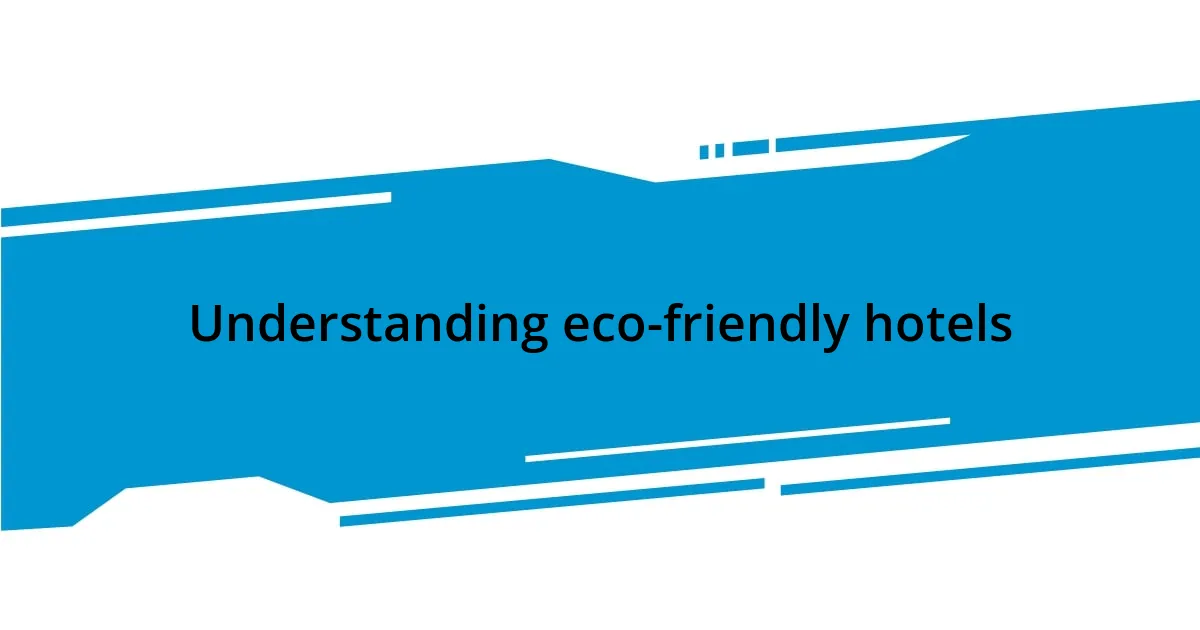
Understanding eco-friendly hotels
When I first learned about eco-friendly hotels, I was struck by how they go beyond just offering a place to stay. These establishments focus on minimizing their environmental footprint through sustainable practices, such as using renewable energy, recycling programs, and locally sourced materials. Have you ever thought about how your accommodation choices could contribute to a healthier planet?
During a recent trip, I stayed at an eco-friendly hotel that made sustainability a core part of its identity. They had an impressive rooftop garden that not only produced fresh herbs for their restaurant but also provided insulation. Experiencing this firsthand made me appreciate how small, thoughtful changes can make a big difference in striving for sustainability. Isn’t it inspiring to think that just by choosing where to stay, we can be part of something bigger?
In my experience, eco-friendly hotels often embed a sense of community within their operations. Whether it’s employing staff from the local area or supporting nearby businesses, they turn into not just places to rest but also contributors to local economies. This connection fosters a feeling of belonging that truly enhances the travel experience, don’t you think?
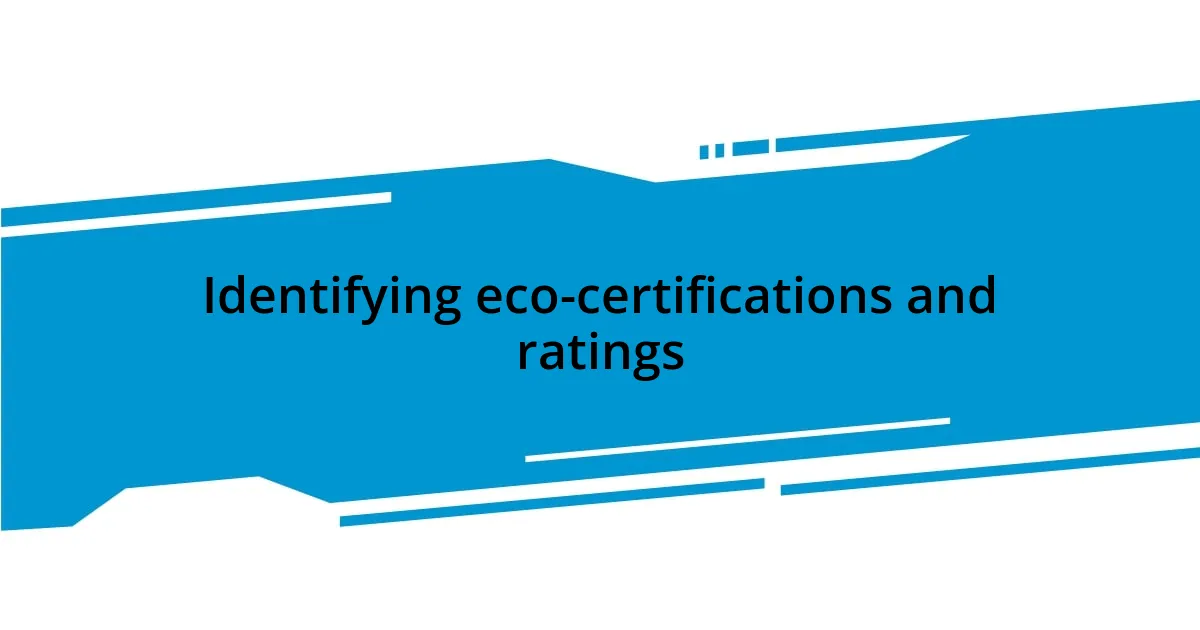
Identifying eco-certifications and ratings
When it comes to identifying eco-certifications and ratings, it’s crucial to know what to look for. I remember my own confusion during my first eco-conscious trip, sifting through labels and seals that all seemed similar. However, I’ve learned that certain certifications can truly illuminate a hotel’s commitment to sustainability. It’s like finding a hidden treasure map – each certification helps me gauge how genuinely eco-friendly a hotel is.
Here are some of the most recognized eco-certifications and ratings:
- LEED (Leadership in Energy and Environmental Design): Focuses on green building practices and energy efficiency.
- Green Key: An eco-label awarded to hotels that have implemented strong environmental practices.
- EarthCheck: A certification scheme that helps tourism operators improve their environmental and social performance.
- Travelife: This certification assesses hotels’ sustainability practices in areas like energy consumption and waste management.
- EcoLabel: A European certification promoting products and services that have a reduced environmental impact.
By familiarizing yourself with these certifications, you can make more informed decisions about where to stay. That sense of assurance you get when you book a hotel with reputable eco-credentials is something I cherish; it’s like knowing I’m contributing to the well-being of our planet, even while I travel.

Evaluating hotel sustainability practices
When evaluating hotel sustainability practices, I always examine their core initiatives. For instance, during a recent stay, I was captivated by how my hotel utilized solar panels to power common areas. This not only reduced their carbon footprint but also inspired me to consider solar energy options for my own home. Have you ever thought about how a hotel’s energy sources can reflect a larger commitment to sustainability?
Next, I look for concrete actions surrounding waste management. One hotel I visited had implemented a robust recycling system, with clearly labeled bins in every room and throughout the property. It was refreshing to engage in this eco-friendly practice alongside other guests, fostering a collective effort. It made me reflect on how simple actions—like proper waste disposal—can contribute significantly to environmental preservation.
Lastly, I assess the local sourcing of food and materials. That same hotel showcased a menu full of dishes made from ingredients sourced within a 50-mile radius, which not only tasted fresher but also supported local farmers. I found it heartening to dine on food that had a story and origin. It brought me closer to that community, enhancing my overall experience. This type of dedication to local practices can truly set an eco-friendly hotel apart.
| Sustainability Practice | Example |
|---|---|
| Energy Usage | Solar panels powering common areas |
| Waste Management | Comprehensive recycling program |
| Local Sourcing | Menu featuring local ingredients |
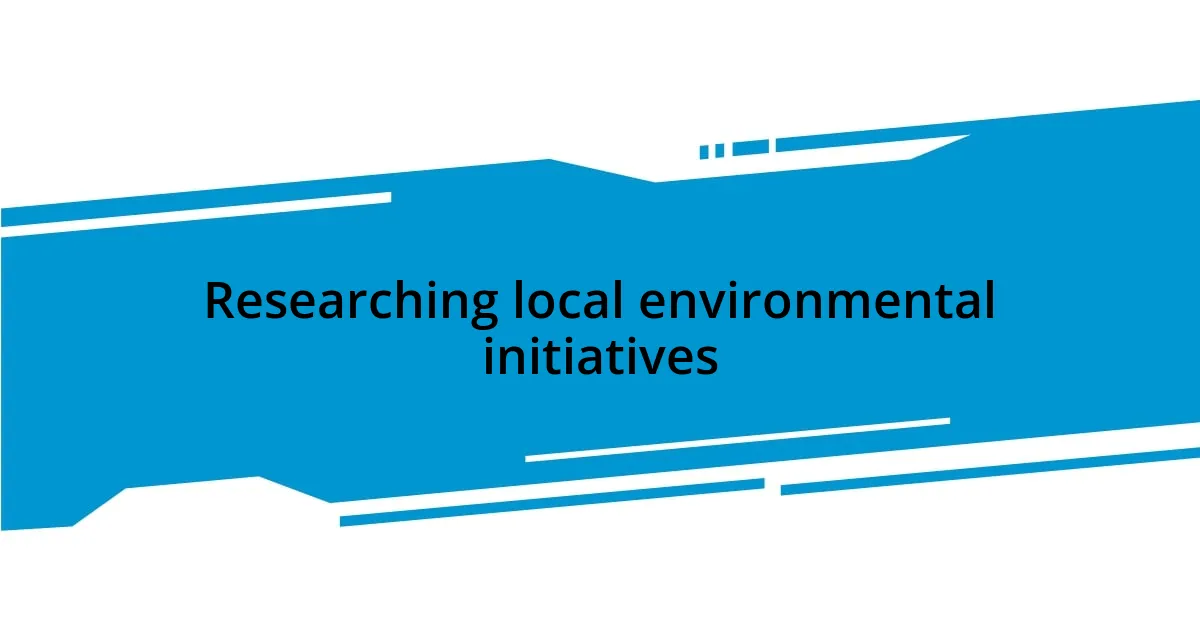
Researching local environmental initiatives
When I dive into researching local environmental initiatives, I often start with community organizations and their ongoing projects. I remember my recent trip to a coastal town where I learned about a grassroots group dedicated to beach cleanups and marine conservation. It was eye-opening to discover how much effort goes into preserving the natural beauty of the area; it made me think about my own impact as a traveler. Have you ever considered how engaging with local initiatives can enhance your travel experience?
Another approach I’ve found effective is exploring how hotels partner with local farmers and artisans. On a memorable vacation, I stayed at a hotel that not only sourced its food from nearby organic farms but also highlighted these connections in its marketing. It was inspiring to see their commitment to supporting local businesses while reducing carbon emissions from transportation. It made every meal feel like a celebration of the region’s culture, and I felt a deeper connection to the place I was visiting.
Additionally, I always check if the hotel participates in any local sustainability programs, such as tree planting or habitat restoration. During one trip, I stayed at a hotel that had adopted a nearby nature reserve, helping to fund conservation efforts and organize volunteer days for guests. I eagerly joined one of those days, and the sense of community I experienced was unforgettable. Isn’t it rewarding to feel like you’re part of something bigger than just your vacation? This involvement adds a meaningful layer to my travels that I cherish deeply.

Comparing hotel amenities and services
When comparing hotel amenities and services, I pay close attention to the small details that reveal a hotel’s commitment to sustainability. For example, during a delightful stay, I noticed that the hotel provided eco-friendly toiletries instead of single-use plastic bottles. It struck me how this simple choice not only reduced plastic waste but also enhanced my overall experience—there’s something special about using products that align with my values.
The dining options often tell a compelling story too. A trip to a mountain retreat had me thrilled to discover their zero-waste kitchen policy. They transformed leftover ingredients into delicious creative dishes, like a vegetable soup made from greens at risk of spoiling. Have you ever had that joy of knowing your meal was prepared with sustainability in mind? It really shifted my perspective on dining choices while traveling and encouraged me to seek similar options in my daily life.
Moreover, the availability of wellness amenities can deeply impact the guest experience. On one occasion, I encountered a hotel that offered yoga and meditation classes using natural light and views of the surrounding landscape. It was an oasis of calm, reminding me that eco-friendly practices aren’t just about the environment; they’re also about creating a harmonious space for guests. It left me wondering how much a peaceful atmosphere contributes to the overall enjoyment of a getaway.
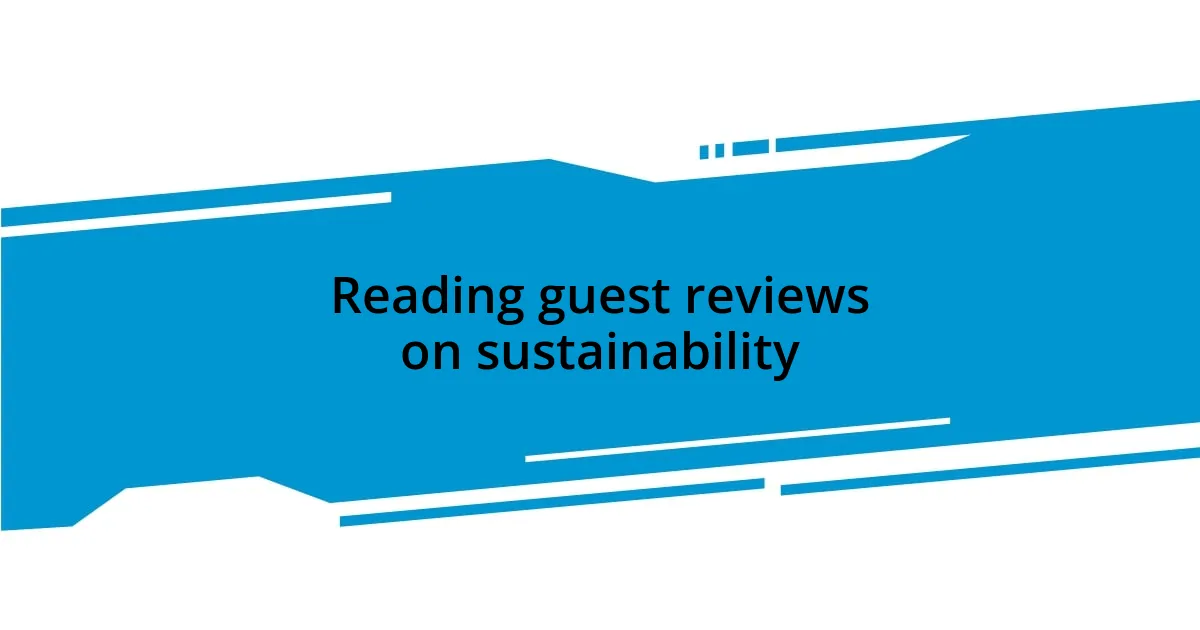
Reading guest reviews on sustainability
Reading guest reviews can be a goldmine for understanding a hotel’s sustainability efforts. I remember browsing through reviews for a boutique hotel in a forested area, and several guests praised their commitment to renewable energy sources. It felt reassuring to see that people had similar values and were prioritizing eco-conscious travel, which made my decision easier.
What truly caught my attention in the reviews was a guest mentioning the eco-friendly practices during their stay. They spoke about the hotel’s efforts to reduce water usage by installing low-flow faucets and offering towel reuse options. Have you ever thought about how small changes can lead to significant impacts? Reading these insights made me feel more confident choosing establishments that genuinely care for the environment.
Sometimes, I come across reviews that highlight the hotel’s community involvement. A guest shared their experience of participating in a local beach cleanup organized by the hotel, which sounded both fun and fulfilling. It made me wonder, how often do we get to contribute positively to the places we visit? Such connections with the community certainly enhance the travel experience and resonate with my desire to make a difference during my journeys.
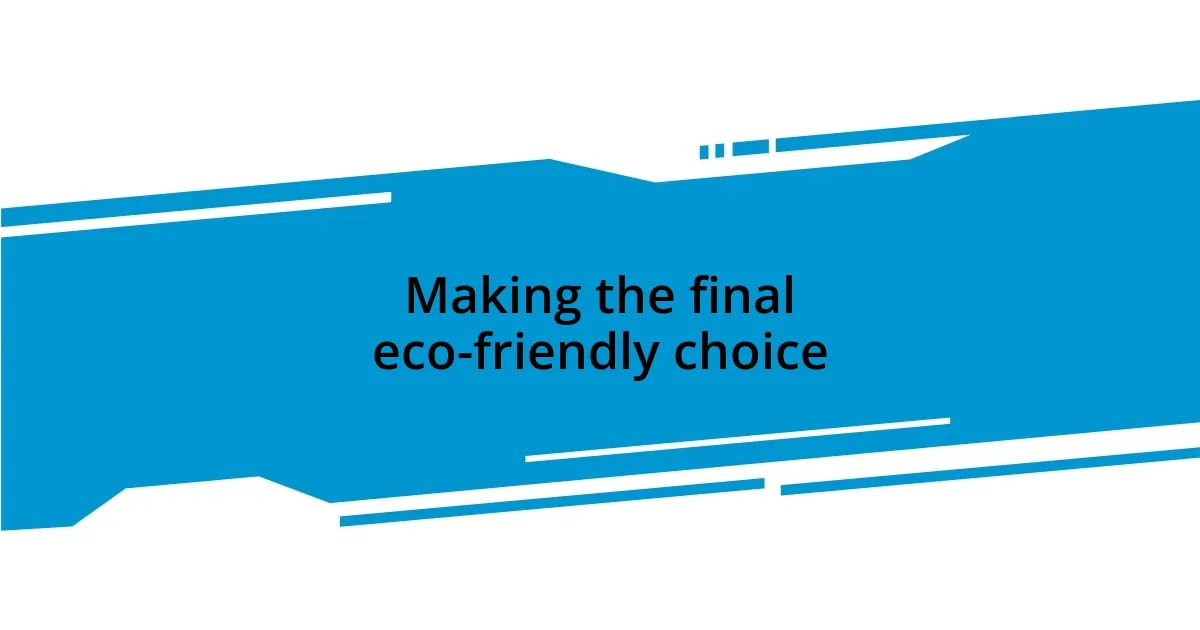
Making the final eco-friendly choice
One key factor that solidified my choice was the hotel’s transparency about its eco-initiatives. I remember being particularly impressed when I found a detailed sustainability report on their website. It included statistics on energy savings and waste reduction efforts that made me feel like I was supporting a genuinely committed establishment. Isn’t it refreshing when a hotel goes the extra mile to keep guests informed about their green practices?
As I narrowed down my options, I also considered the location and its influence on sustainability. I once opted for a charming coastal hotel that emphasized its commitment to reducing carbon footprints by sourcing local ingredients and supporting nearby artisans. It was rewarding to witness how choosing a place that values its community led to an authentic and enriching experience. How often do we overlook the impact of our choices on local economies when traveling?
Ultimately, I found that my eco-friendly choice represented more than just where I would stay—it felt like an extension of my values. The warm interactions with staff who were genuinely passionate about their role in sustainability reinforced my decision. Have you ever felt that strong connection during a trip? It’s moments like these that remind me of the power of conscious choices, not just for myself but for the planet, too.
















